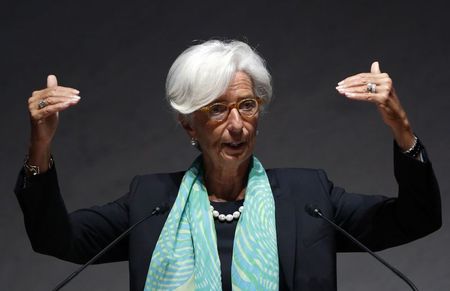By Elaine Lies
TOKYO (Reuters) - Japanese Prime Minister Shinzo Abe's targets for empowering women, a key part of his economic growth strategy, could add substantially to annual growth if met, International Monetary Fund (IMF) head Christine Lagarde said on Friday.
Speaking at the opening of the "World Assembly for Women", a global conference on women's issues, Lagarde said that given Japan's rapid ageing, bringing women into the workforce was essential.
Her message dovetails with Abe's vows to increase women in the workforce, a key part of his plans to boost the world's third-largest economy known as "Abenomics" - and one reason behind Tokyo's hosting of what it hopes will be an annual event.
Abe, who took office late in 2012, has set a goal of having women in 30 percent of management jobs by 2020, as opposed to 11 percent now. He has also pledged other measures, such as increasing daycare.
"We think that these measures can really pay off - adding a quarter percent to growth each year if implemented aggressively," Lagarde told a packed lecture hall.
But she also warned that symbolic moves would do little and that the Japanese workforce, traditionally a bastion of dark suits and neckties, needed substantial structural change.
"Even so, it falls short of the one percent boost to growth that Japan needs for Abenomics to succeed with flying colours," she added. "So while women can save Japan, they need help from other structural reforms."
Abe said much more remained to be done for women.
"We have been working to stimulate economic growth while also making various efforts to support the dynamic engagement of women," he said.
In a cabinet reshuffle earlier this month he appointed a record-tying five women and placed a woman in one of the top posts in his political party.
The reshuffle was aimed at improving slumping support, amid concerns that Japan's economic recovery is flagging, and seems to have achieved that goal, especially among women. Polls after the reshuffle show a spike in support for Abe and his party among women, from 43 percent to 59 percent.
But analysts reckon the jump is unlikely to last and that making sure the benefits of Abe's economic policies are felt more widely throughout the country will matter more to voters.
Lagarde said Japan's rapid ageing would diminish economic vitality and living standards unless something is done.
"We expect growth potential of only about one percent over the medium term," she added. "There is one obvious option for rescuing Japan from this harsh economic fate - empowering women."
Japan has far to go. The Orgnization for Economic Cooperation and Development said it ranks among the bottom of industrialised nations in terms of employing women who have college degrees, a situation Lagarde said was worsened by a lack of daycare facilities and other support.

Only 69 percent of Japanese women with university degrees have jobs, below the OECD average of 80 percent and behind 92 percent of Japanese men, according to the study released this month but based on data from 2012.
(Editing by Nick Macfie)
